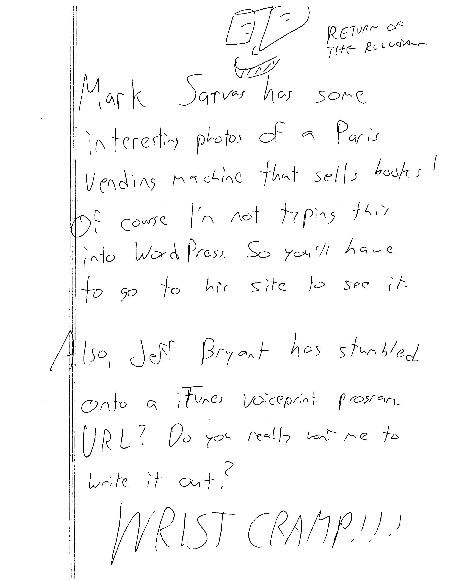Tim Redmond’s public flailing against Craig Newmark has garnered a few notable responses. Locally, there was a thread over at the SFist, in which mystified San Franciscans responded. More prominent, however, is Anil Dash’s rant against predictable liberalism and defensive newspapers.
But what I see here in all these reactions is hostility and divisiveness from both sides. (I still remain as baffled as Dave Barry was by a Chronicle reporter’s recorded comment, “I have podcasted. I’m not a complete idiot.” And I have, in a few private incidents, been privy to outright hostility from print reporters when trying to piece together a story.) The journalist boosters note the online paucity of what Crooked Timber’s Henry Farrell has identified as a a “comprehensive, neutral and authoritative argument” (emphasis in original). The online boosters decry how out-of-touch the journalists are, pointing out the new playing field requires people to keep current and unfettered. But both parties share an fascinating and one-note view: the reactionary need to keep both forms separate and discrete, as if bloggers and journalists should be neatly arranged into some red state-blue state dichotomy.
Yes, newspapers will dip their toes into the podcast arena, as admirably as the Chronicle has. But they will do so without understanding the podcast’s personal, subjective and, one might argue, authentic and perhaps unpolished form. Because there are innumerable blogs trying to get to a story first, the blogger will leap to get her hands on a story quick. But because the work is rushed, there will be mistakes and corrections — the possibility that misinformation might sneak through the cracks and be further disseminated.
But at the risk of allowing my idealistic side to come through, isn’t this all pretty silly? One would think that journalists, many of whom are intimately familiar with the innovations of gonzos like Tom Wolfe, Hunter S. Thompson and George Plimpton, would embrace an alternative after decades banging out the same who what when where why template. Likewise, one would think that the bloggers and the podcasters would see the creative and informational value of limitations, much less holding onto a story until more confirmed information has come in.
As someone who has worked both sides of the spectrum, I’m wondering why, in all the ink that’s been spilled on the subject, so few people are willing to put their bile aside and contemplate some hybrid of the two forms. You want to talk Web 2.0? Let’s try fusion. What if the newspapers hired more bloggers and podcasters? What if bloggers set self-imposed limits on their content or made more phone calls instead of relying exclusively on Google search results?
Anger, arrogance and dismissiveness might make a writer feel good and drum up some initial attention. But take it from a piss-and-vinegar guy like me: it’s the ideas, multilateralism and flexibility that will stand the test of time. I fail to understand why the blogging/journalism war has become as inflammatory as the situation in Beirut. Surely, both sides have much to learn and benefit from each other.
